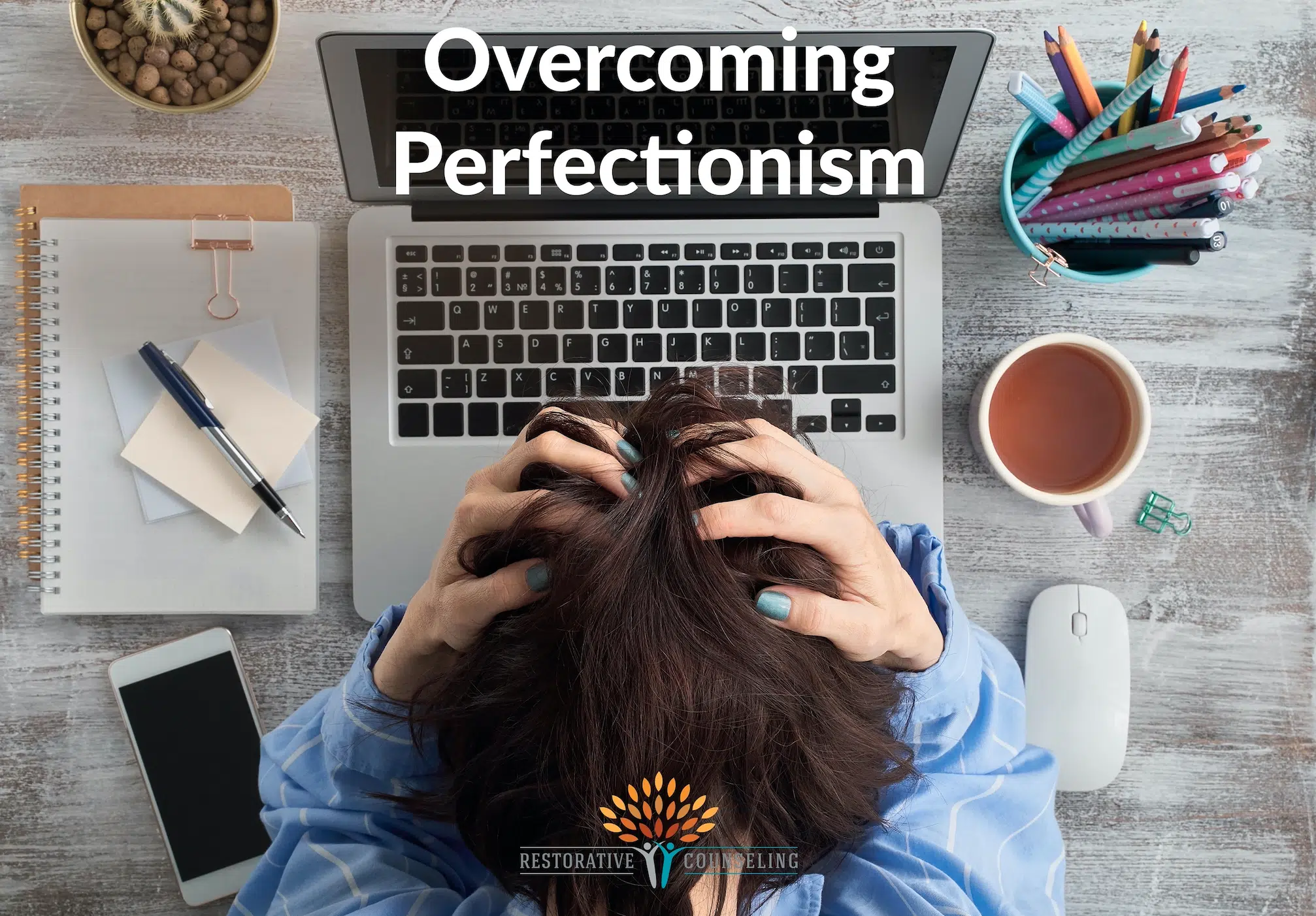Written by The Restorative Counseling Team
Our society seems to be based on competition and being the best. It is no wonder that people can begin to feel entangled with the impossible need to be perfect. Being perfect at parenting, in work or school, in our relationships, and on social media. In the world of technology, it has become much easier to compare ourselves to others. With these constant reminders of our perceived shortcomings, perfectionism can begin to creep in leaving us feeling unworthy, anxious, and depressed.
Consider the following as an example of perfectionism:
Stu is a college student who has a paper due tonight at 11:59 pm. Stu has known about this paper for a week and has tried several times to begin writing his paper, but he keeps putting it off. He finds himself opening his laptop to Word and blankly staring at the screen.
Stu began jotting down a few sentences only to erase them repeatedly. He thinks to himself; I am so dumb. What will they think of me? Stu notices his heart beginning to race, and feels overwhelmed, stressed, and anxious, and thinks, If I don’t get this done right now, I am a failure.
Stu worked tirelessly throughout the evening and completed his paper. He was exhausted, but he wanted it to be perfect! Finally, he submits his paper yet does not feel satisfied. The battle continues in his mind; I will never get a job if I don’t get this A.
Let us support you as you break free from perfectionism.
Begin Today
Stu’s background:
Growing up, Stu’s parents praised him for getting straight A’s. His parents often told him that the key to success and a happy life was to follow the rules, earn approval from others, and get the best grades in his class. Whenever Stu came home with an A-, he would be reprimanded, which left him feeling worthless.
It makes sense why Stu strives for perfection. Humans are hardwired to seek love, compassion, and connectedness. Coupled with compliments and approval, these feelings and needs are validated. The act to always be perfect assures individuals that they will be accepted if they are always pursuing perfection.
Many individuals can relate to Stu. In fact, research shows that perfectionism amongst college students has increased from 1989 to 2016 and is linked to mental health concerns including depression and anxiety (Curran and Hill, 2019). Perfectionism does not solely impact college students, however. Perfectionism is an issue across the lifespan (Ferrari et al., 2018).
Here are some examples of how perfectionism might show up:
- Doubting the quality of your actions
- High attention to detail and difficulty seeing the “big picture”
- Fear of negative evaluation
- Setting unrealistic expectations
- Engaging in thinking errors (“If I don’t get this done, I am a failure”)
- Not seeking out/avoiding new activities
- Feeling anxious, depressed, frustrated, angry, or ashamed
Spending life chasing perfectionism can leave individuals feeling hugely exhausted and disappointed because perfection is not achievable.
Tips to overcome perfectionism:
1. Recognize and understand your perfectionism.
The first step is to become aware of perfectionism. Dialectical Behavioral Therapy (DBT) mindfulness skills can aid in becoming more aware of your thoughts, behavioral urges, emotions, and sensations.
Helpful questions to ask yourself:
- Do I find it extremely difficult to be flexible?
- Are my standards too high for me to accomplish tasks on time?
- Do I find myself in all-or-nothing thought patterns?
- What urges or bodily sensations do I feel when I think about making a mistake?
- Are important areas of my life suffering because of my high standards? (work, school, relationships)
2. Reframe your thoughts.
- “I work so hard and yet I am still a failure” 🡪 “I am excellent because I try my best”
- “I should never make mistakes” 🡪 “It is ok to make mistakes. My mistakes do not reflect who I am as a person”
- “My performance is going to be terrible” 🡪 “I do not know how well I will perform at this moment and I know I am capable”
3. Take small steps in challenging yourself.
Struggle with fear of judgment when showing up to an event late? Imagine yourself showing up late and note what this feels like. With the support of a therapist, gradually build yourself up to showing up 15-20 minutes late. Eventually, you will start to notice this will become much easier.
4. Practice Self Compassion.
When you make a mistake because you are human and you will, what might it look like to hold compassion and kindness toward yourself in the same way you would as a close friend? Offering yourself genuine kindness when you make a human error can help you to find compassion and understanding from within rather than seeking validation or approval from outside sources (compliments, grades, Instagram likes).
5. Seek professional help.
If your drive to be perfect is causing you significant distress in your life, it is important to reach out to a licensed professional for help! Restorative Counseling is ready to support you!
It can feel extremely frustrating to repeatedly not meet our own perceived, or society’s, high expectations. With the support of an individual therapist, Stu identified harmful thought and behavioral patterns as well as environmental factors that were keeping him stuck in his hustle for perfection. Week after week he felt alleviated from the pressure he was placing on himself. He felt more equipped to cope with mistakes and rejection. Finally, Stu was able to feel a sense of freedom and accept himself with compassion and kindness.
Resources:



